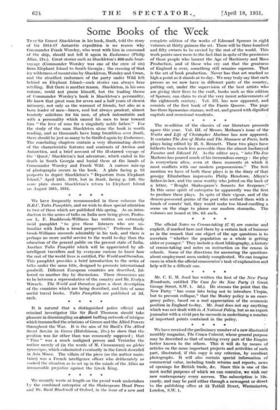Some Books of the Week
Tn!►'r Sir Ernest Shackleton in his book, South, told the story of his 1914-17 Antarctic expedition is no reason why Commander Frank Worsley, who went with him in command of the ship, should not tell it again in Endurance (Philip Allan, 21s.). Great stories such as Shackleton's 800-mile boat- voyage (Commander Worsley was one of the crew of six) from Elephant Island to South Georgia ; the crossing of that icy wilderness of mountains by Shackleton, Worsley and Crean, and the steadfast endurance of the party under Wild left behind on Elephant Island—such stories can always bear retelling. But there is another reason. Shackleton, in his own volume, could not praise himself, but the leading theme of Commander Worsley's book is Shackleton's personality. He knew that great man for seven and a half years of closest intimacy, not only as the warmest of friends, but also as a born leader of men—brave, cool but always prudent, almost tenderly solicitous for his men, of pluck indomitable and with a personality which caused his men to bear toward him " the love of sons for a singularly noble father." For the study of the man Shackleton alone the book is worth reading, and as thousands have hung breathless over South, there should be just as many to be thrilled again by Endurance. The concluding chapters contain a very illuminating sketch of the characteristic features and contrasts of Arctica and Antarctica, and a brief account of the ill-starred voyage of the ' Quest,' Shackleton's last adventure, which ended in his death in South Georgia and burial there at the hands of Commander Worsley and Frank Wild. A curious mix-up of photographs occurs in the book. A plate facing p. 95 purports to depict Shackleton's " Departure from Elephant Island," April 24th, 1916, but in South, facing p. 240, the same plate shows Shackleton's return to Elephant Island on August 30th, 1916.














































 Previous page
Previous page